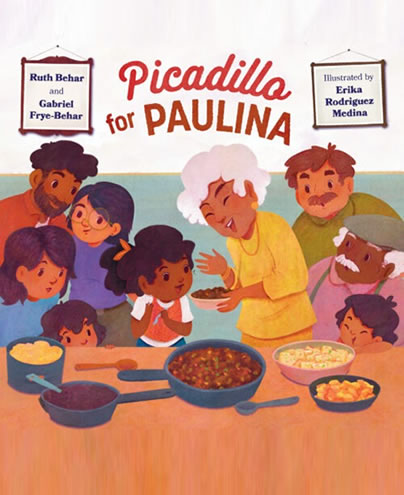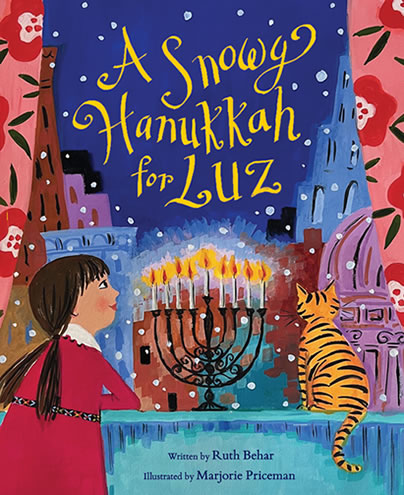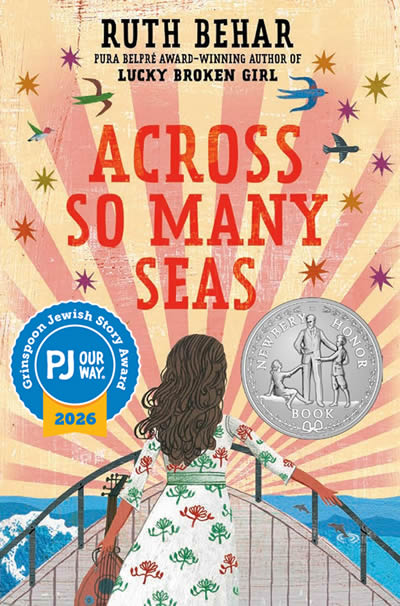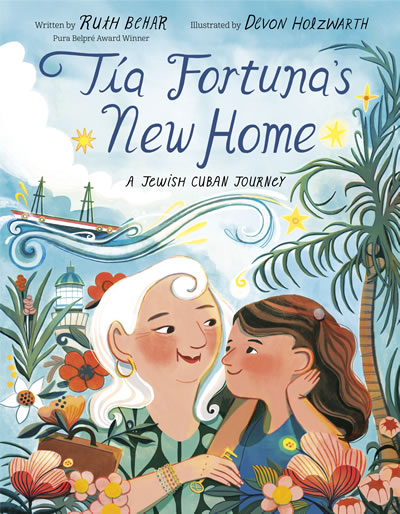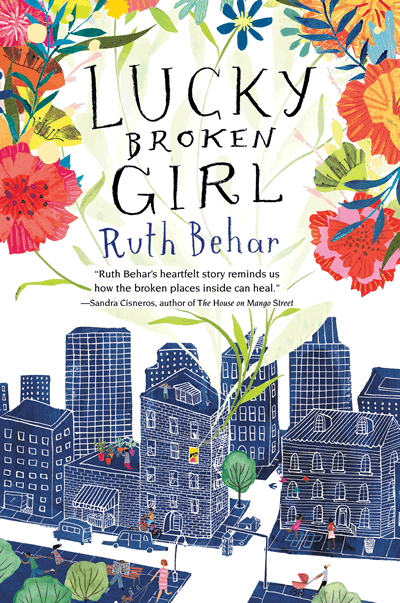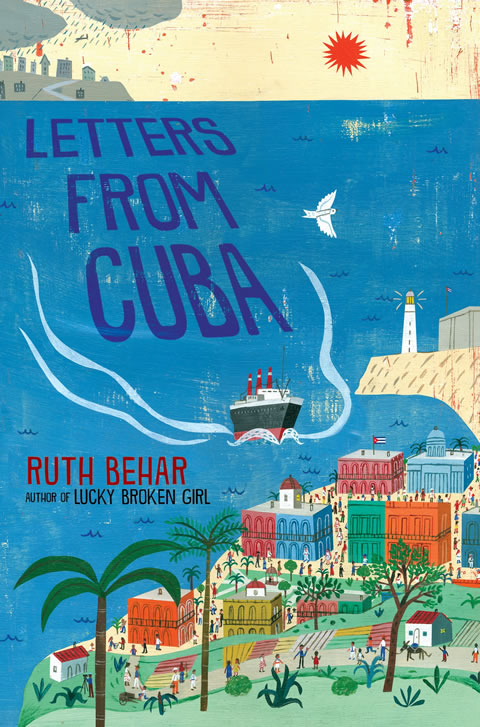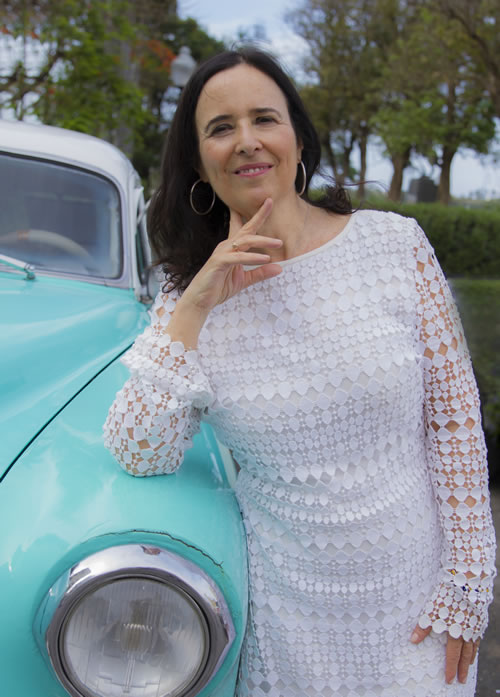Ruth is delighted to announce she has two picture books on the way!
PICADILLO FOR PAULINA
by Ruth Behar & Gabriel Frye-Behar, Illustrated by Erika Rodriguez Medina
Release Date: August 25, 2026
She is thrilled to have been able to collaborate on a second picture book with her son, Gabriel Frye-Behar. Their co-authored, PICADILLO FOR PAULINA, is a heartwarming story about Cuban food and family.
A SNOWY HANUKKAH FOR LUZ
by Ruth Behar, Illustrated by Marjorie Priceman
Release Date: September 15, 2026
She also has a new picture book, A SNOWY HANUKKAH FOR LUZ, that examines the everyday miracles that surround us as an Abuelita and a granddaughter prepare for the holiday, bringing together Ashkenazi and Sephardic traditions.
Ruth’s New Middle Grade Novel
ACROSS SO MANY SEAS, a story of four Sephardic girls in four different times and places united by their desire to belong and to matter.
Across So Many Seas, received the PJ Our Way’s Grinspoon Jewish Story Award for 2026!!
Across So Many Seas, is a @bankstreetlibrary Best Children’s Book of the Year for 2025!!
Across So Many Seas, is a Best Children’s Book of the Year for 2025!!
Across So Many Seas, has been named a 2025 Notable Social Studies Trade Book by The Children’s Book Council
Across So Many Seas, has been named one of the 2025 Notable Children’s Books in Language Arts by the Children’s Literature Assembly of the National Council of Teachers of English (NCTE)
Across So Many Seas, wins 2025 Newbery Honor Book Award
Across So Many Seas, wins 2025 Sydney Taylor Honor Book Award
Across So Many Seas, Read John Schu’s interview with Ruth about receiving “the call” about the Newbery Honor Award.

Best books of 2024
New York Public Library, Best Books for Kids 2024
Kirkus Reviews, Best Middle Grade Books of 2024
School Library Journal, 42 Stellar Middle Grade | SLJ 2024 Stars So Far
Evanston Library, Evanston Public Library’s 101 Great Books for Kids 2024: Middle Grade Fiction / Novels for Kids
Tablet, The Best Jewish Children’s Books of 2024
Imagination Soup, What are the best middle grade books of 2024?
Praise for Across So Many Seas
![]() Behar delivers a moving tale about four generations of a Sephardic Jewish family navigating cultural and societal upheaval from 1492 to 2003.
Behar delivers a moving tale about four generations of a Sephardic Jewish family navigating cultural and societal upheaval from 1492 to 2003.
★ Publishers Weekly, starred review
![]() Powerful and Resonant.
Powerful and Resonant.
★ Kirkus, starred review
![]() Paths of milk and honey for this new book. It sings with poetry and history and story all at once. I enjoyed traveling and learning the path of the ancestors. ¡Felicidades! May our Dio guide this book and bring it many blessings.
Paths of milk and honey for this new book. It sings with poetry and history and story all at once. I enjoyed traveling and learning the path of the ancestors. ¡Felicidades! May our Dio guide this book and bring it many blessings.
-Sandra Cisneros, author of The House on Mango Street
![]() As lyrical as it is epic, Across So Many Seas reminds us that while the past may be another country, it’s also a living, breathing song of sadness and joy that helps define who we are.
As lyrical as it is epic, Across So Many Seas reminds us that while the past may be another country, it’s also a living, breathing song of sadness and joy that helps define who we are.
-Alan Gratz, New York Times bestselling author of Refugee
Other books by Ruth Behar
I am so honored that the @childrensbookcouncil has included my three middle-grade novels, ACROSS SO MANY SEAS, LETTERS FROM CUBA, AND LUCKY BROKEN GIRL in its Fall 2025 Showcase, “I’m Not From Here—The Immigrant Experience.” As a child immigrant, a daughter and granddaughter of immigrants, I am proud of my immigrant heritage and I view myself as a storyteller of all the journeys that brought me to where I am today.
![]()
![]() So many people are looking for a place to call home. I want to imagine that the world has a very large heart and can give all of us who have lost our homes a chance to start over.
So many people are looking for a place to call home. I want to imagine that the world has a very large heart and can give all of us who have lost our homes a chance to start over.
– Ruth Behar, Letters from Cuba
![]()
Ruth Behar is an award-winning author exploring the vulnerability we all share.
As a storyteller, traveler, memoirist, poet, teacher, and public speaker, Ruth Behar is acclaimed for the compassion she brings to her quest to understand the depth of the human experience. She made her fiction debut with her Pura Belpré Award-Winning novel, Lucky Broken Girl, which explores how the worst of wounds can teach a child a lesson about the fragile, precious beauty of life. Her recent novel, Letters from Cuba, inspired by the story of her maternal grandmother’s courageous efforts to save her Polish Jewish family, was named a Sydney Taylor Notable Book and received an International Latino Book Award. Tía Fortuna’s New Home, is a lyrical ode to cultural memory and heritage, and her picture book, Pepita Meets Bebita, co-authored with her son, Gabriel Frye-Behar, is about the joys and challenges of a growing family as seen from the perspective of a beloved dog. Her latest middle-grade novel, Across So Many Seas, is a story of four girls from different generations of a Sephardic family, seeking a home where all are welcome. Born in Havana, Cuba, she grew up in New York, and has also lived in Spain and Mexico. Her memoirs, The Vulnerable Observer, An Island Called Home, and Traveling Heavy, and her bilingual poetry book, Everything I Kept/Todo lo que guardé, examine her return journeys to Cuba and her search for home as an immigrant and a traveler. She was the first Latina to win a MacArthur “Genius” Grant. Her honors also include a John Simon Guggenheim Fellowship, a Distinguished Alumna Award from Wesleyan University, a Fulbright Award, an honorary doctorate in Humane Letters from Hebrew Union College, and being named a “Great Immigrant” by the Carnegie Corporation. Recently elected to the American Academy of Arts and Sciences, she is an anthropology professor at the University of Michigan and lives in Ann Arbor, Michigan.
Ruth is a member of:
Original author photo by Ivana Blanco Gross. Photo editing by Gabriel Frye-Behar.
Bio photo: May Reguera Studio, Havana.
Flower details on the site, courtesy of Penelope Dullaghan.
Tia Fortuna’s New Home illustrations by Devon Holzwarth.
Click here to add your own text


